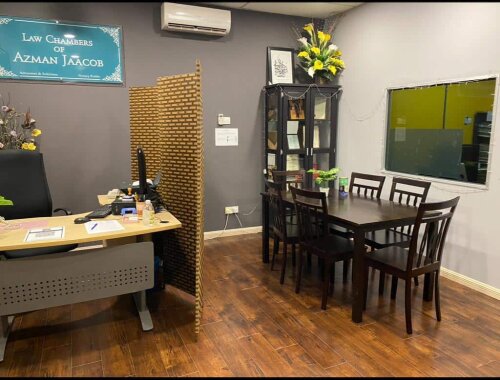Best Sanctions & Export Controls Lawyers in Putrajaya
Share your needs with us, get contacted by law firms.
Free. Takes 2 min.
List of the best lawyers in Putrajaya, Malaysia
About Sanctions & Export Controls Law in Putrajaya, Malaysia
Sanctions and export controls are critical aspects of international trade law and security regulations in Malaysia, including Putrajaya, the nation’s federal administrative center. These laws govern the export, re-export, transfer, and transit of goods, technologies, and services, particularly those that could affect national security, international obligations, or foreign policy. Sanctions typically restrict dealings with specific countries, entities, or individuals, while export controls regulate the movement of sensitive items such as strategic technologies, dual-use goods, and armaments. In Malaysia, the law is shaped by local regulations and Malaysia’s commitments to United Nations Security Council (UNSC) resolutions, as well as obligations under international conventions and bilateral agreements.
Why You May Need a Lawyer
Navigating sanctions and export controls can be highly complex, with significant legal consequences for non-compliance. Common situations where legal help may be required include:
- Exporting goods or services that may be subject to licensing or permit requirements.
- Trading with individuals, entities, or countries under Malaysian, UN, or other international sanctions.
- Investing in joint ventures or business activities involving sensitive technologies or dual-use items.
- Responding to investigations, audits, or enforcement actions taken by Malaysian authorities.
- Uncertainties about compliance programs or the extra-territorial effect of local and international sanctions.
- Drafting contracts or supply chain agreements subject to regulatory restrictions.
A qualified lawyer can help you interpret the relevant legislation, obtain necessary licenses, reduce legal risks, and represent you in dealings with government agencies.
Local Laws Overview
Malaysia's legal framework for sanctions and export controls is guided primarily by the Strategic Trade Act 2010, which governs the transfer, transit, brokering, and export of strategic items and technologies. The Act establishes a licensing regime, enabling authorities to control the movement of military and dual-use goods. Additionally, the Anti-Terrorism Act 2015 and related regulations empower the government to impose and enforce financial or commercial sanctions for national security and international obligations, including those arising from UN Security Council resolutions.
Key aspects in Putrajaya to be aware of include:
- Requirement to obtain prior licenses for exporting, transiting, or brokering certain goods and technologies.
- Penalties for non-compliance can include significant fines, imprisonment, and seizure of goods.
- Strict liability for companies and individuals, including directors and officers of organizations.
- Regular updates to sanctioned party lists and goods subject to export control.
Local authorities, particularly the Ministry of International Trade and Industry (MITI), the Royal Malaysian Customs Department, and Bank Negara Malaysia, play significant roles in enforcement and regulatory oversight.
Frequently Asked Questions
What are export controls?
Export controls are regulations that govern the movement of goods, technologies, and services across Malaysia’s borders, especially those considered strategic, military, or dual-use.
Who administers export control laws in Malaysia?
The Ministry of International Trade and Industry (MITI) is the central authority for export controls. Other agencies such as the Royal Malaysian Customs Department and Bank Negara Malaysia also have roles in enforcement and policy.
What are sanctions, and who imposes them?
Sanctions are legal restrictions that may prohibit or limit trade or financial dealings with certain countries, entities, or individuals. They can be imposed domestically by the Malaysian government or internationally, such as through the United Nations.
Do all exporters need a license to export goods?
Not all goods require a license, but items categorized as strategic, military, or dual-use typically do. It is essential to check the relevant lists and consult with authorities or a legal advisor.
What happens if I breach Malaysia’s export controls?
Violations can result in severe penalties, including fines, imprisonment, confiscation of goods, and revocation of business licenses.
Are there specific goods commonly regulated under export controls?
Yes. These include arms and related material, high-performance computing equipment, advanced electronics, aerospace parts, nuclear materials, and certain chemicals and biological agents.
How does Malaysia enforce sanctions and export controls?
Enforcement is carried out by various authorities, such as MITI, Customs, and the Central Bank. Methods include inspections, audits, investigations, and cooperation with international agencies.
Can individuals as well as companies be held liable?
Yes. Both individuals and corporations, including directors and officers, can be held liable for violations of sanctions and export control laws.
Are there international implications for Malaysian companies?
Yes. Malaysian businesses may face additional obligations through international treaties, UN sanctions, or extra-territorial laws from trading partners.
What steps can I take to ensure compliance?
Implement internal compliance programs, conduct regular due diligence, consult with legal professionals, and stay updated with regulations and sanctioned party lists.
Additional Resources
For those seeking guidance or further information, the following resources and authorities are particularly relevant in Putrajaya:
- Ministry of International Trade and Industry (MITI) - Oversees export controls and licensing.
- Royal Malaysian Customs Department - Handles inspections and enforcement at borders.
- Bank Negara Malaysia - Regulates financial sanctions and controls on currency movement.
- Attorney General’s Chambers of Malaysia - Provides guidance on legal interpretations.
- Malaysia External Trade Development Corporation (MATRADE) - Offers support and resources for exporters.
- United Nations Security Council Resolutions - For information on international sanctions obligations.
Next Steps
If you believe you require legal assistance regarding sanctions and export controls in Putrajaya, Malaysia, consider the following actions:
- Identify the specific goods, services, or transactions that may be subject to controls or sanctions.
- Gather all relevant documentation, including contracts, shipping records, and correspondence.
- Consult a qualified lawyer or law firm with expertise in Malaysian trade law, sanctions, and export controls.
- Contact MITI or related government bodies for guidance or to verify licensing requirements.
- Stay informed on regulatory updates to ensure ongoing compliance.
Taking prompt and informed action can help avoid costly legal issues and maintain your business operations in full compliance with Malaysian and international law.
Lawzana helps you find the best lawyers and law firms in Putrajaya through a curated and pre-screened list of qualified legal professionals. Our platform offers rankings and detailed profiles of attorneys and law firms, allowing you to compare based on practice areas, including Sanctions & Export Controls, experience, and client feedback.
Each profile includes a description of the firm's areas of practice, client reviews, team members and partners, year of establishment, spoken languages, office locations, contact information, social media presence, and any published articles or resources. Most firms on our platform speak English and are experienced in both local and international legal matters.
Get a quote from top-rated law firms in Putrajaya, Malaysia — quickly, securely, and without unnecessary hassle.
Disclaimer:
The information provided on this page is for general informational purposes only and does not constitute legal advice. While we strive to ensure the accuracy and relevance of the content, legal information may change over time, and interpretations of the law can vary. You should always consult with a qualified legal professional for advice specific to your situation.
We disclaim all liability for actions taken or not taken based on the content of this page. If you believe any information is incorrect or outdated, please contact us, and we will review and update it where appropriate.










